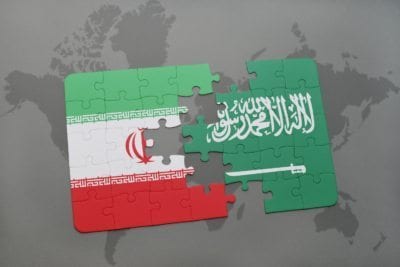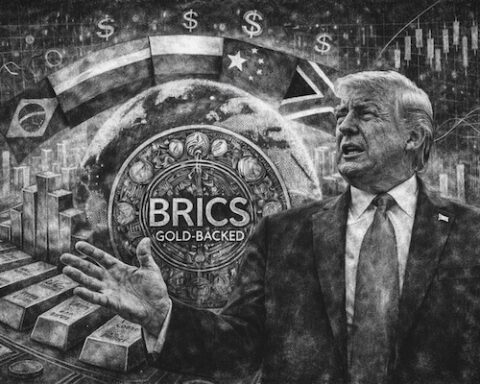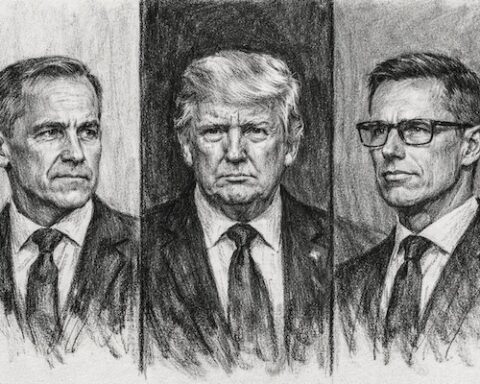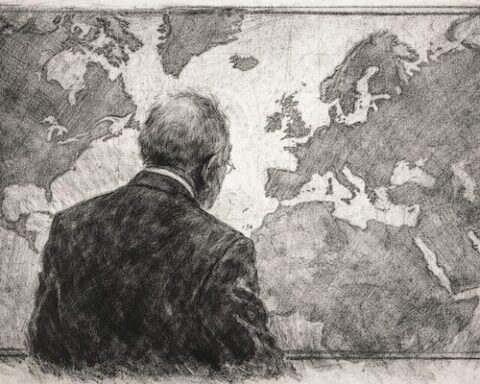A candid examination of the prospect of moving on from Saudi influence towards a partnership with Iran.
| By John Sjoholm, Lima Charlie News OpEd
Those who oppose a shift away from Saudi Arabia as a primary ally in the Middle East tend to fall into one of two distinct camps: those self-interested in maintaining the flow of Saudi resources and influence, and those elected to state opinions maintaining the status quo. Alternatively, those in favor of a dynamic shift towards Iran as a primary ally, similarly fall into two camps. The first is the foolhardy youth determined to cause waves inside the beltway, and the second is is the military and intelligence veterans who have spent extensive time outside the secure zones, walking the roads less travelled.
And to all of the above parties, I say, “the Game… has changed.”
With lines in the sand being redrawn and reshaped — modified into organic boundaries in stark contrast to the artificial lines drawn by audacious, post-colonialist European leaders — America finds itself in its most vulnerable position since the London Eastern Committee of the War Cabinet met with their peers a little over a hundred years ago.
While America has considerable resources and a noble image to defend, an empire is not necessarily defined by its land mass or by the number of people it commands. Instead, it forges self-definition by how well it uses resources and how effectively it wields power. With its U.S.—Iran agreement, the Obama Administration has made good on its promise to push diplomacy to the forefront — an objective the previous Administration failed to accomplish. And while a good start, the agreement does not, in and of itself, establish either diplomatic relations or an alliance. But neither is necessary for the U.S to focus efforts and forge a commercially viable relationship that will, in turn, stabilize the region. If this occurs, it will be at the expense of the Sunni-Saudi seat of power. But that is an expense the U.S. can afford.
With Shia influence growing across the region and our incursion into Iraq merely hastening its progress, rather than halting it in its tracks, the old Sunni guard is in its final death-throes. And like a cornered animal, it’s getting exceedingly prone to dangerous outbursts. So far, none of these costly outbursts have netted any measurable evidence signaling the potential for success.
For the past 20 years, it’s been common for the U.S. and Iran to engage mutual enemies, due largely to self-interest rather than any concerted effort to achieve a common goal. Saudi Arabia, in contrast, plays both sides of the table. Moving forward, as the U.S. seeks to define its path in the Middle East, it’s important to weigh, carefully, the factors that determine which allegiances we seek and validate. Should the U.S. allow existing dogma — which in many cases is outdated and irrelevant — to control its future legacy in this volatile region?
Iran is a winner, and Americans like winners. Americans love a scrapper who goes up against the Big Guy. And wins. Even if that big guy is the U.S., or one of its close allies (Israel for example), the U.S. tends to develop a soft spot for a winner. After all, it takes moxie to go up against the U.S., and not only challenge, but win.
Iran’s proxy militia, Hezbollah, beat the Israelis tactically and strategically in Lebanon, attacking American institutions and killing scores of Americans while suffering minimal loss. Time and again they’ve undermined and won against colossal American-supported boondoggles, due in large part to their superior understanding of both the lay of the land and the voice of the people. Currently, they exist as a state within the state, maintaining an uneasy peace with the U.S. and its agents. If pressed into conflict, Lebanon would fall to Hezbollah in everything but name and little could be done to prevent it.
Iran has the potential to be a strong geopolitical and strategic ally in the region.
Geographically it’s perched at the pivot point between Chinese, Russian and European zones of influence. With the press of a button it can disrupt or enable most of the Gulf State’s oil dealings and then sit back to sip tea. They’ve proven themselves resourceful and effective in their quest to build a modern-day Persian empire in the best tradition of soft influence.
What American does not smile a little at the invocation of Theodore Roosevelt’s “Speak softly, and carry a big stick”? Yet America has, in the region, failed to do both. We do not talk softly – and the region knows that while our figurative “stick” is expansive and well-financed, it’s also easily defeated. The answer lies in our ability to let calmer heads prevail. By proceeding with caution and prudence, we can at the very least find ourselves in a situation of amiable local stability in an otherwise vicious stew of tribal and cultural dispute. For that to occur, we need viable partners in the region — those with a proven track record who are willing to embrace the risk of accepting the U.S. as a partner with the common objective of stability.
As the West adapts to new domestic energy policies and consumption standards, consumer strength and power structure shift its dependency on OPEC oil production. And with this shift, the need for reliable and stable partners increases. Additionally, Iranian natural gas reserves (15% of the world’s reserves) could eliminate European dependency on Russian natural gas. And when coupled with Canadian oil reserves (which represented 40% of the U.S.’s import of oil in 2015), Iran’s supply could remove the lion’s share of the West’s long-term dependency on OPEC oil. It’s important to note that Iraqi oil reserves are largely controlled by well-placed and robustly supported Tehranian proxies — Shias that Tehran has supported for some time.
America’s alliance with Saudi Arabia is based in part on the premise that Sheikh Faisel, of the House of Saud, agreed to allow a military presence in Saudi Arabia, and further presence across the Arab world. This was permitted out of fear that the arguably more pragmatic and stronger “Sayyid” Hashemite family in Jordan would unseat the House of Saud from Mecca, and with it, its claim to Saudi Arabia and authority in Islam. In other words – maintain the status quo. But with growing turbulence in this area of shifting alliances, it may be time to consider a new strategy and a wholesale shift in allegiance.
Appeasement of religious extremists has led to disastrous military campaigns and a belligerent stance towards our premier ally in the region, Israel.
By all accounts, the U.S. has made good on its agreement. It assured the safety of Saudi Arabia and protected the other OPEC borders for well over fifty years, and in turn, the OPEC leadership has used America’s reliance on oil-resources as a weapon when it suited them. Any attempts to bring progressive, pro-humanitarian reform, whether initiated internally or externally, have been met with resistance. Those that do occur, require significant concessions to a highly conservative religious leadership — the Ummlah in the country. Such concessions in the past have included safe harboring, financial support and even arms logistics for foreign and domestic extremists. Appeasement of religious extremists has led to disastrous military campaigns and a belligerent stance towards our premier ally in the region, Israel.
In recent months Canadian high-caliber sniper rifles have appeared in the hands of Syrian Sunni rebels — weapons that can be traced by the Canadian Ministry of Defense and proven to have been sold to Saudi Arabia. The time between the sale, delivery, and appearance in Syria, indicate that the Saudis near immediately upon reception turned the Canadian arms around and shipped them to Syria upon delivery.
In the 70s and 80s, while Jordan, Syria and Egypt cracked down on fundamentalist fighters and the religious scholars supporting them, the Saudi regime offered the extremists safe passage and financial aid. This allowed Osama Bin Laden, a Saudi-Yemeni, to re-establish himself in Sudan in the early 90s. At this time, Bin Laden linked-up with the Egyptian Islamic Jihad (EIJ) — an offshoot of the Muslim Brotherhood — which was financed in part by Saudi interests and which adheres to the same fundamental interpretation of Islam. With Bin Laden in Sudan, the EIJ attempted to assassinate Egyptian President Hosni Mubarak, an American ally and strong man. This, in turn, hastened Bin Laden’s decision to relocate to Afghanistan, where he would join the Saudi-supported Taliban government — but not before attempting to assassinate members of the U.S. intelligence community that were stationed in Khartoum.
Yet, despite all of the logistical and financial support, and the Saudi’s status as the presumed leader of the Sunni realm and the holder of sacred Mecca, Riyadh has failed to inspire strong bonds of loyalty. To put it whimsically, the Sauds are like the rich uncle who attends family gatherings and who receives gentle treatment because everyone knows he’ll dole out money to whomever falls into favor. And as often is in such cases, favor is lost or gained due to decidedly arbitrary reasons.
By reason of the Saudi’s particular flavor of support in the region — consisting almost exclusively of financial aid — they don’t wield the same level of influence as Iran. This is due largely to the fact that Iran’s support comes in the form of competency (smart money) and product. If Iran were to withdraw support, a Saudi-supported “Big Army” could surround insurgents and massacre them at will. And since insurgents understand this all too well, Iran has managed to create proxy upon proxy of both Shi’ite and Sunni moderates and extremists, all of them beholden and controlled, in varying degrees, by Tehran.
Saudi Arabia has not been inclined toward such activities, and as such they do not have the necessary skillset to initiate them now, when needed the most.
While Jordan, Egypt and Syria have proven willing to take in refugees — albeit with mixed results — Saudi Arabia has been absent in the humanitarian sense. And this despite being both a central and initiating player in the latest batch of conflicts and disorder. Unlike the others, Saudis appear to reject their brethren, choosing instead to keep them at arm’s length.
Everything in this country [Saudi Arabia] revolves around religion, this is something that people of the West will never understand.
– Prince Amr al Faisal
In order to fully appreciate the importance of shifting from a Sunni-Saudi alliance, to a Shia-Iranian alliance, the origin-story of Saudi Arabia must first be understood. In so doing, it becomes apparent that, while obvious benefits exist, the alliance is doomed to fail. If the U.S. remains vested in the post-Ottoman boundaries — and in the artificial power structure therein — it is bound to be dragged into a vortex of swiftly diminishing returns.
In 1902 the House of Saud created, under the leadership of Sheikh Aziz, Saudi Arabia. This was accomplished with the help of Wahhabi religious leaders who traded their tribal fighters, the Ikhwan, in exchange for the promise that the House of Saud would propagate their beliefs. Once the land had been conquered, the Ikhwan turned against the House of Saud in a grand example of takfiri. Sheikh Aziz turned to the religious leadership of the country, who ruled in Sheikh Aziz’s favor that the Ikhwan had no right to usurp the House of Saud. To cement the family power, Sheikh Aziz declared himself king, and married the daughter of every tribal leader in the country, fathering 45 legitimate sons. The total number of daughters, or illegitimate sons, is not known. While the House of Saud under Sheikh Aziz was not overly religious, it needed the Ikhwan troops of the Wahhabi persuasion.
Wahhabis believe that theirs is the true faith. Islam in its purest form. Wahhabis live by a staunch and exclusive dogma that mirrors the Taliban in its intensity, although the message differs. Anything that differs from the Wahhabi’s belief is regarded as objectionable and unholy. The preferred titles of the Wahhabi believer are “al-Muwahhidun,” or “Ahl al-Tauhid,” meaning “the Asserter of the Divine Unity”. Tauhid is considered to be the very foundation of Islam, the defining core values and purity in its essence. Any deviation thereof would be wicked, corrupt and evil. This is also where the al-Ikhwan al-Muslimun, or “The Muslim Brotherhood” gets its flare. It is always good to know that our best allies in the region have some overlap with our friendly like-minded groups across the region.
Wahhabism began with Muhammed b´ Àbd al-Wahhab (B:1703) born in the Najd part of what is today Saudi Arabia. Najd has traditionally been a fiercely Islamic indoctrination center considered a sanctuary of spiritual renewal, although some would say people come there to get their arrogance validated.
Najd is also where, it is believed, an hadith has been placed that the “al zalazil wa ‘l-fitan wa qarn al-shaytan”, or “the disturbance of great disorder and children of Satan” will arise. In other words, it is considered the holy site where the “end of days” will begin. As such, it is heavily guarded in preparation for this fateful day.
Islamic scholars, including ‘al-Wahhab’s father and brother, noted al-Wahhab’s disturbing deviance in his belief system. In fact, as al-Wahhab formulated the beliefs that we today refer to as Wahhabism, the first official refutation came from his own brother. al-Wahhab’s beliefs caused the early dismissal of his father from his post at the Islamic school, where he was an Imam, and forced them to move to Huraymila, a significantly less prominent and esteemed town than Njad.
You are the ones who can’t live without oil. You know, we come from the desert, and our ancestors lived on dates and milk and we can easily go back and live like that again.
– Sheikh Faisel
Saudi Arabia is an ally that, during the 1973 Arab-Israeli War, withdrew oil from world markets to protest U.S. involvement, quadrupling the price of oil which lead to the devastating energy crisis of the mid to late 70’s. In a meeting with Henry Kissinger, Sheikh Faisel asserted “You are the ones who can’t live without oil. You know, we come from the desert, and our ancestors lived on dates and milk and we can easily go back and live like that again.”
Fortunately, the new generation emerging today in Saudi Arabia is ill equipped to fulfill Sheikh Faisel’s threat. No longer Beduin desert marauders, it would take at least two generations of hardship to return to their previous form. And as Saudi Arabia’s financial resources are draining, experts estimate that they have under 10 years remaining, at the current revenue/expense trajectory, before 1930’s level financial disparity sets in. It is predicted that Saudi Arabia will soon reach a breaking point where, if it wants to retain control over Mecca and its artificially maintained living standards, Saudi’s will need America far more than America needs them.
Iran on the other hand is excelling at using its available resources, even during the hardship of the imposed financial embargos from the West, able to create soft influence with an edge. Its proxy asymmetric warfare capabilities coupled with lean, effective information-operation campaigns, are unrivaled even by Israel. Whereas Saudi Arabia is currently a descending star in the night sky, Iran’s star is rising.
And thus, this is the right time to seek Iran’s partnership. If the U.S. intends to remain in the Middle East — in any form and on an institutional level — it must seek not to praise overt involvement in the region, but rather seek to bury it. The U.S. might best be served in the region by embracing anti-imperialism and engaging partners who can, in turn, embrace the American experiment in a measured, and valued fashion. The region has a fundamental culture where soft power — albeit with a firm local hand — has traditionally been the accepted and historically successful approach to move forward. It is time to acknowledge this objective truth, and operate accordingly.
As is evident in the current U.S. election, the current lineup of candidates lack either the backbone or informed intelligence to make the decisions necessary to achieve security and prosperity in the region. We can only hope that current and future administrations will seek to advance relations with Iran above what has been stated in the media — through covert diplomacy means — to a level we haven’t witnessed since the Kissinger in China years, or Philip Habib’s near heroic efforts in the heyday of American-Middle East diplomacy.
It is certain that the Israeli lobby, in an act of short sighted reactionary madness, would oppose any President who proceeds pragmatically and rationally in this manner. Only a President with the willpower necessary to create a lasting legacy as a true uniter and peacemaker could consider such an option. And the only way to ensure such a legacy would be to initiate the act in such an aggressive manner that the incoming administration will have very little recourse but to follow the path laid out before them.
This would not be the first time an exiting Commander-in-Chief took this approach. President Eisenhower did so with great success against President Kennedy in matters concerning both South East Asia and South America. Such an act could also serve, in the short term, to help the new administration justify and excuse the loss of value in U.S. currency that will occur, inevitably, when the U.S. switches from the petrodollar to an unencumbered free market basis. This would, in turn lead to energizing and revitalizing the ailing American blue collar production by making physical products viable to the greater world-wide market. And in the truest form of laissez-faire capitalism, the obvious excellence of the U.S. free market would succeed above all others. On merit alone.
From this new foreign policy — built not on dependency in the now stabilizing region, but by the freedom to do business where business is to be done — the West can ensure that the three main parties in the region, Israel, Saudi, and Iran, can find mutual ground in negotiations behind closed doors, instead of propagating and enduring the dividing dogma that is fed to their domestic audiences. This in turn would help appease and dismantle the threat of a first strike scenario from either Iran or Israel.
Surely some disconcerting appeasements would have to be made – the U.S. would have to supply Iran with logistics so that it can modernize, repair, and possibly even replace, its ailing Grumman F-14 Tomcat fleet. But this can be done by selling the U.S.’s remaining fleet of F-14’s and spare parts thereof — a fleet deactivated since 2006.
Israel would no doubt seek additional appeasements from the U.S., once the Israeli lobby’s attempt to paint the exiting administration’s Iranian strategy negatively and with a wide brush fails, in the form of trade considerations in the tech market and the defense import/export industry of Israel.
Additionally the U.S. would see an increased, albeit tacit, desire from the Saudis to expand its response forces capability in the region, which would, of course, require an increase of troops stationed within the Saudi Arabian borders.
Iran seeks legitimization. Let the West and the U.S. provide it to them. Because, in the end, no matter what approach is taken, Iran will remain. Just as Israel will. And Iran will not go away quietly or allow their influence to be decreased throughout the region. The West can join them, or it can attempt to stand in the way of an impending flood and drown by doing so.
John Sjoholm, Lima Charlie News
John Sjoholm is Lima Charlie’s Middle East Bureau Chief, Managing Editor, and founder of the consulting firm Erudite Group. A seasoned expert on Middle East and North Africa matters, he has a background in security contracting and has served as a geopolitical advisor to regional leaders. He was educated in religion and languages in Sana’a, Yemen, and Cairo, Egypt, and has lived in the region since 2005, contributing to numerous Western-supported stabilisation projects. He currently resides in Jordan. Follow John on Twitter @JohnSjoholmLC
Lima Charlie World provides global news, featuring insight & analysis by military veterans, intelligence professionals and foreign policy experts Worldwide.
For up-to-date news from the Middle East, please follow us on twitter at @LimaCharlieNews and @JohnSjoholmLC

![IMage Should the U.S. Shift From Saudi Arabia to Iran? [Lima Charlie News]](https://limacharlienews.com/wp-content/uploads/2016/09/Iran-Saudi-SEPT-6.jpg)












